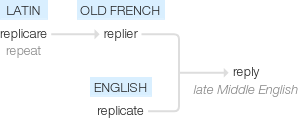Reply
late Middle English (as a verb): from Old French replier, from Latin replicare ‘repeat’, later ‘make a reply’ (see replicate).
wiktionary
From Middle English replyen, replien, borrowed from Old French replier(“to reply”), from the Latin replicō, replicāre(“I fold back”) (in Late or Medieval Latin "to reply, repeat"), from re + plicō(“I fold”); the noun derives from the verb by nominalisation. Doublet of replicate and replica.
etymonline
reply (v.)
late 14c., replien, "respond verbally, make an answer; make opposition, retaliate," from Old French replier "to reply, turn back," from Late Latin replicare "to reply, repeat," in classical Latin "fold back, fold over, bend back," from re- "back, again" (see re-) + plicare "to fold" (from PIE root *plek- "to plait").
The classical literal sense of "to fold back, turn or fold (something) back" is attested from early 15c. in English but is not now used. Modern French répliquer is formed directly from the Latin verb and used in the sense of "to replicate," also "to reply," while replier, reploier is for the literal senses "to fold, fold up, curl up." Related: Replied; replying.
reply (n.)
"an answer, a response," especially one in words or writing, 1550s, from reply (v.).
